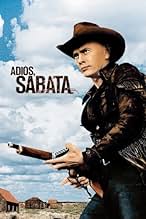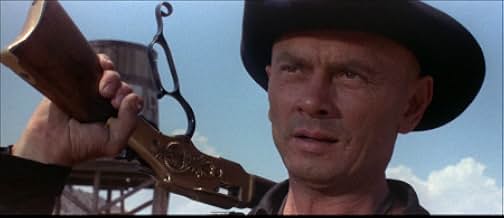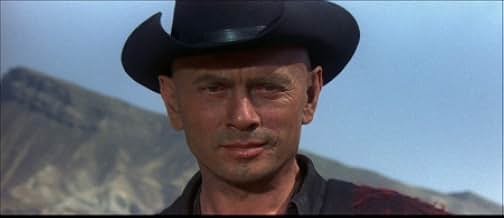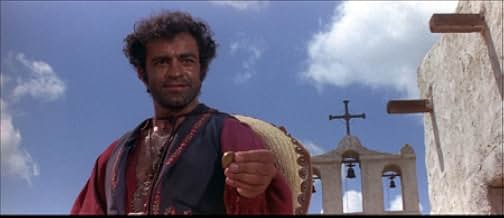NOTE IMDb
5,9/10
2,5 k
MA NOTE
Ajouter une intrigue dans votre langueSabata helps a band of Mexican revolutionaries steal a wagon-load of gold from the occupying Austrian forces of Emperor Maximilian I.Sabata helps a band of Mexican revolutionaries steal a wagon-load of gold from the occupying Austrian forces of Emperor Maximilian I.Sabata helps a band of Mexican revolutionaries steal a wagon-load of gold from the occupying Austrian forces of Emperor Maximilian I.
- Réalisation
- Scénario
- Casting principal
Ignazio Spalla
- Escudo
- (as Pedro Sanchez)
Gérard Herter
- Colonel Skimmel
- (as Gerard Herter)
Turam Quibo
- Gitano
- (as Joseph Persaud)
Nieves Navarro
- Kingsville Saloon Dancer
- (as Susan Scott)
Vittorio Caronia
- 1st Lt. Steiner
- (as Vitti Caronia)
Avis à la une
In his one and only venture into the pasta western, Yul Brynner finds himself succeeding Lee Van Cleef as the mysterious gunfighter Sabata who gets himself involved in Mexican politics in trying to overthrow the Emperor Maximilian. There hasn't been a film yet where the Juaristas aren't the good guys, even in Juarez where Brian Aherne made a sympathetic if somewhat naive Maximilian. It's such a clear case of imperialism.
But Yul isn't a total good guy and he teams up with three partners to steal a shipment of gold from the occupiers and give it to the Juaristas ostensibly. Actually the four of them are only as good as they have to be. And they've got another along, an American played by the only American actor in Adios Sabata, Dean Reed, who has an agenda all his own who keeps a positively explosive diary.
As most of us know even those who get their history from films, the Emperor Maximilian was an Austrian, but who was put on the newly created Mexican throne by the French and sustained by the French army. But here we have Austrian occupiers including an Austrian commander who also has a private agenda. I'm betting the producers were thinking that German types make so much better villains than the French.
Sabata's distinguishing characteristic was a rife that he had a long holster for and drew like a revolver. This rife had a unique horizontal magazine from where the bullets came. But the last chamber always had a cigar which Yul would light up after a killing well done.
I'm not a fan of spaghetti westerns and don't usually give them good reviews. It's the American genre and should be done by Americans. This one is no exception. But I will say that Yul Brynner's cynical look throughout the film is quite priceless.
But Yul isn't a total good guy and he teams up with three partners to steal a shipment of gold from the occupiers and give it to the Juaristas ostensibly. Actually the four of them are only as good as they have to be. And they've got another along, an American played by the only American actor in Adios Sabata, Dean Reed, who has an agenda all his own who keeps a positively explosive diary.
As most of us know even those who get their history from films, the Emperor Maximilian was an Austrian, but who was put on the newly created Mexican throne by the French and sustained by the French army. But here we have Austrian occupiers including an Austrian commander who also has a private agenda. I'm betting the producers were thinking that German types make so much better villains than the French.
Sabata's distinguishing characteristic was a rife that he had a long holster for and drew like a revolver. This rife had a unique horizontal magazine from where the bullets came. But the last chamber always had a cigar which Yul would light up after a killing well done.
I'm not a fan of spaghetti westerns and don't usually give them good reviews. It's the American genre and should be done by Americans. This one is no exception. But I will say that Yul Brynner's cynical look throughout the film is quite priceless.
Long before the Terminator, Sabata (this time Yul Brynner in his only spaghetti western) uttered the infamous words, "I'll be back." This is the second of Gianfranco Parolini's Sabata trilogy, but it is not a sequel, as the characters and story are different. Like the first, it is also written by Renato Izzo, who went on to write the video nasty Night Train Murders after finishing the trilogy.
Brynner had the cool look that probably got him the Westworld gig a few years later.
Ignazio Spalla is back from the fist film, but with a different name (Escudo). Maybe he changed it to hide.
Sabata joins Escudo and revolutionaries trying to overthrow Austrian Archduke Maximillion, who ruled over Mexico as an imperial dictator; of course, Sabata was only after gold. Others were as well, so it was not a walk in the park.
It is fortunate that the Archduke had plenty of soldiers to sacrifice to the cause.
Well, Lee Van Cleef, Ignazio Spalla, and Aldo Canti will be back in the final Sabata film.
Brynner had the cool look that probably got him the Westworld gig a few years later.
Ignazio Spalla is back from the fist film, but with a different name (Escudo). Maybe he changed it to hide.
Sabata joins Escudo and revolutionaries trying to overthrow Austrian Archduke Maximillion, who ruled over Mexico as an imperial dictator; of course, Sabata was only after gold. Others were as well, so it was not a walk in the park.
It is fortunate that the Archduke had plenty of soldiers to sacrifice to the cause.
Well, Lee Van Cleef, Ignazio Spalla, and Aldo Canti will be back in the final Sabata film.
This is not really a Sabata film, but often Italian westerns pretended to be sequels just to get unwitting customers to come to see the films*. For example, Franco Nero's "Django" was very successful so practically every Italian film producer brought out a Django film but with a different leading man--and a completely different plot! Here, cashing in on the Sabata craze (small as it was), a non-Sabata film starring Yul Brynner is suddenly a Sabata film thanks to dubbing! In fact, originally, Brynner's character was called 'Indigo Black'. I checked and there were seven Sabata films--only two which are REAL Sabata films with Lee Van Cleef. The rest, like "Adios Sabata" are just rip-offs. So is this a BAD rip-off or a decent and watchable rip-off? Read on to see...
The plot of this film is close to that of a real Sabata film in that although he looks mean and shoots people by the score, this incarnation finds him doing this in order to help the Mexican Civil War of 1867. Now that doesn't mean he won't take a percentage for himself as well! A percentage of what you may ask....GOLD. It seems an evil (but very stylish) Austrian colonel is shipping gold--gold which could be used by the revolutionaries to buy weapons. However, Sabata isn't alone in this quest--he's taking along a fat guy, two VERY strange acrobats and a pretty-boy named Ballentine--who you KNOW is up to no good.
As far as Italian westerns go, this theme is VERY common--though most of the time the hero is helping the anti-Diaz forces of the Mexican Civil War of the 1910s. This one is set much earlier and has to do with getting rid of the imposed leader, Maximillian. Regardless, this one is reasonably entertaining, full of insanely good shots and has a touch of humor. Worth seeing but not a particularly novel film...except when it comes to one of the acrobats. His skill is handling a very large ball bearing kind of like a hacky sack--which he then hurls with his foot at people with deadly accuracy! Ha...worth seeing just to see this guy in action. ball bearing guy
*The same spirit of intellectual dishonesty was also rampant in Asian films after the death of Bruce Lee. Many supposedly new and recently discovered Lee films flooded the market--starring folks such as Bruce Li or consisting of home movies of Lee or outtakes from his films interspersed with a double wearing sunglasses! These films were ALL horrible--whereas a few of the Italian knockoffs were actually watchable. Plus, at least the Italian films had cool music.
The plot of this film is close to that of a real Sabata film in that although he looks mean and shoots people by the score, this incarnation finds him doing this in order to help the Mexican Civil War of 1867. Now that doesn't mean he won't take a percentage for himself as well! A percentage of what you may ask....GOLD. It seems an evil (but very stylish) Austrian colonel is shipping gold--gold which could be used by the revolutionaries to buy weapons. However, Sabata isn't alone in this quest--he's taking along a fat guy, two VERY strange acrobats and a pretty-boy named Ballentine--who you KNOW is up to no good.
As far as Italian westerns go, this theme is VERY common--though most of the time the hero is helping the anti-Diaz forces of the Mexican Civil War of the 1910s. This one is set much earlier and has to do with getting rid of the imposed leader, Maximillian. Regardless, this one is reasonably entertaining, full of insanely good shots and has a touch of humor. Worth seeing but not a particularly novel film...except when it comes to one of the acrobats. His skill is handling a very large ball bearing kind of like a hacky sack--which he then hurls with his foot at people with deadly accuracy! Ha...worth seeing just to see this guy in action. ball bearing guy
*The same spirit of intellectual dishonesty was also rampant in Asian films after the death of Bruce Lee. Many supposedly new and recently discovered Lee films flooded the market--starring folks such as Bruce Li or consisting of home movies of Lee or outtakes from his films interspersed with a double wearing sunglasses! These films were ALL horrible--whereas a few of the Italian knockoffs were actually watchable. Plus, at least the Italian films had cool music.
The film talks about Sabata or Indio Black (Yul Brynner) , a gunfighter dressed in dark buckskin with fringes . He along with a motley group of revolutionary bandits have purports to steal a wagon loaded of gold from a devious Austrian Colonel called Skimmel (Gerard Herter) serving to Emperor Maximiliano during the Mexican Civil War against Benito Juarez . The misfit group is formed by different characters each one with particular ability , as the deaf-mute (Sal Borgese) is an expert thrower of balls , the dancer Gitano or Gypsy (Joseph Persaud) who does a Flamenco dance of death ; besides a fat , ironic Mexican (Pedro Sanchez or Ignacio Spalla acting in similar roles to Spaghetti idol Fernando Sancho) and a cocky , ruddy young man (the singer Dean Reed , early deceased) .
The picture contains Western action , gun-play , comedy , tongue-in-cheek and a little bit of violence . The film gets the comic remarks from Western parody united the features of typical Spaghetti as violent confrontation , ambitious antiheroes , bloody and spectacular showdown with several deaths , quick zooms and extreme baddies . This was not originally a Sabata film , the original Italian title translates as "Indio Black, you know what? You're a big son of a..." . Indio Black being the character played by Yul Brynner , but the title and Brynner's character name were changed for the American release to cash in on Sabata (1969) , the original film . Yul Brynner as a tough gunfighter with technical weaponry (like a Western James Bond) is enjoyable , similarly the previous Sabata : Lee Van Cleef , who was playing the role as 'Chris' in the following to first entry ¨The Seven magnificent¨ whose starring was the famous bald . At the same time Brynner filmed ¨Catlow¨ by Sam Wanamaker also in a lookalike role and similar plot , but it also narrates the robbing a Mexican gold shipment . Gerard Herter as a nasty and cruel Austrian officer with monocle named Colonel Skimmel is magnificent , but he repeats the role who starred in ¨The big gundown¨ (by Sergio Sollima with Lee Van Cleef) also with Nieves Navarro , here playing a very secondary role as a gorgeous saloon dancer . Bruno Nicolai musical score is lively and atmospheric , he's an usual collaborator to Ennio Morricone . The picture was well produced by Albert Grimaldi (¨Trilogy of dollars¨ producer) . The film was professionally directed by Frank Kramer (pseudonym of Gianfranco Parolini) who made the original and best ¨Sabata¨, continuing with ¨The return of Sabata¨ ; besides directing another Spaghetti hero : ¨Sartana¨ with Gianni Garco and Klaus Kinski, and his last Western again with Lee Van Cleef : ¨Diamante Lobo¨ . The flick will appeal to Yul Brynner fans and Spaghetti Western enthusiasts.
The picture contains Western action , gun-play , comedy , tongue-in-cheek and a little bit of violence . The film gets the comic remarks from Western parody united the features of typical Spaghetti as violent confrontation , ambitious antiheroes , bloody and spectacular showdown with several deaths , quick zooms and extreme baddies . This was not originally a Sabata film , the original Italian title translates as "Indio Black, you know what? You're a big son of a..." . Indio Black being the character played by Yul Brynner , but the title and Brynner's character name were changed for the American release to cash in on Sabata (1969) , the original film . Yul Brynner as a tough gunfighter with technical weaponry (like a Western James Bond) is enjoyable , similarly the previous Sabata : Lee Van Cleef , who was playing the role as 'Chris' in the following to first entry ¨The Seven magnificent¨ whose starring was the famous bald . At the same time Brynner filmed ¨Catlow¨ by Sam Wanamaker also in a lookalike role and similar plot , but it also narrates the robbing a Mexican gold shipment . Gerard Herter as a nasty and cruel Austrian officer with monocle named Colonel Skimmel is magnificent , but he repeats the role who starred in ¨The big gundown¨ (by Sergio Sollima with Lee Van Cleef) also with Nieves Navarro , here playing a very secondary role as a gorgeous saloon dancer . Bruno Nicolai musical score is lively and atmospheric , he's an usual collaborator to Ennio Morricone . The picture was well produced by Albert Grimaldi (¨Trilogy of dollars¨ producer) . The film was professionally directed by Frank Kramer (pseudonym of Gianfranco Parolini) who made the original and best ¨Sabata¨, continuing with ¨The return of Sabata¨ ; besides directing another Spaghetti hero : ¨Sartana¨ with Gianni Garco and Klaus Kinski, and his last Western again with Lee Van Cleef : ¨Diamante Lobo¨ . The flick will appeal to Yul Brynner fans and Spaghetti Western enthusiasts.
Firstly, this is *not* a sequel to 1970's "Sabata" ("Ehi amico... c'è Sabata, hai chiuso!") although it can be considered a follow up of sorts. Lee Van Cleef did not reprise the role until 1971's "Return of Sabata". "Adiós Sabata" was originally about a character called Indio Black and completely unrelated to the previous Sabata story - Indio, I believe, was meant to be nothing more than a bandit. The name was changed to cash in on the success of "Sabata" - though this film could be considered a true Sabata entry as a couple of stars return (Pedro Sanchez, Gianni Rizzo) and the screenwriters and director are the same. Gianfranco Parolini (Frank Kramer) perhaps out does the previous film here, keeping everything tighter - "Sabata" was a little too jokey (although still excellent and one of the truly great Italian westerns) whereas this is blatantly tongue in cheek. I feel the music is better in this film, never intrusive and always fitting: a triumph for Bruno Nicolai, despite the fact that it is incredibly reminiscent of Morricone.
As Sabata, Brynner is a kind of anti-hero counterpart to Chris from "The Magnificent Seven"; he even dresses out all in black here too. Gérard Herter is great as the Austrian Colonel Skimmel at the time of Emperor Maximillian's Mexico - a kind of borderline camp, Bond villain type, complete with monacle and perfectly trimmed moustache. Oh, and yes, he is a dead shot with a rifle. In "Sabata", Franco Ressel's Stengel had his shootout's behind man shaped shields (to live at the peak of danger or some such nonsense) as his playtoy; Herter's Skimmel has an even better one - a drawer beneath a model ship that when opened fires each cannon on the model directly into whoever opens the drawer. Like "The Good, the Bad and the Ugly" (which this film contains some surprisingly subtle references to) the plot centres around a shipment of gold: Sabata, Escudo (Sanchez) and Ballantine (Dean Reed) want the wagon load of gold, but it is also coveted by Maximillian's rebels. The scenes with the gold and the gold dust being poured out/spilled is nicely complimented by Nicolai's incidental music which really does bring out the joy of the characters.
I personally think it's a shame that Brynner and the others weren't brought back for another Sabata film because he plays the role much straighter than Van Cleef did and really does come across as a tough guy here, who doesn't need to rely on his gun. "Adiós Sabata" is a classic in it's own right and doesn't need to be viewed with the other Sabata entries. It's only downside is that after surpassing the superb original, it left most people disappointed with the later "Return of Sabata".
Are these subtle hints to Leone's 1966 masterpiece? Sanchez: "Me, I'd make a hiding place no-one would find - stick it in the ground, maybe in a cemetery..." Reed (the last line): "Hey fellas - are you gonna help me pick up the gold or not, you sons of...!" (music takes over)
As Sabata, Brynner is a kind of anti-hero counterpart to Chris from "The Magnificent Seven"; he even dresses out all in black here too. Gérard Herter is great as the Austrian Colonel Skimmel at the time of Emperor Maximillian's Mexico - a kind of borderline camp, Bond villain type, complete with monacle and perfectly trimmed moustache. Oh, and yes, he is a dead shot with a rifle. In "Sabata", Franco Ressel's Stengel had his shootout's behind man shaped shields (to live at the peak of danger or some such nonsense) as his playtoy; Herter's Skimmel has an even better one - a drawer beneath a model ship that when opened fires each cannon on the model directly into whoever opens the drawer. Like "The Good, the Bad and the Ugly" (which this film contains some surprisingly subtle references to) the plot centres around a shipment of gold: Sabata, Escudo (Sanchez) and Ballantine (Dean Reed) want the wagon load of gold, but it is also coveted by Maximillian's rebels. The scenes with the gold and the gold dust being poured out/spilled is nicely complimented by Nicolai's incidental music which really does bring out the joy of the characters.
I personally think it's a shame that Brynner and the others weren't brought back for another Sabata film because he plays the role much straighter than Van Cleef did and really does come across as a tough guy here, who doesn't need to rely on his gun. "Adiós Sabata" is a classic in it's own right and doesn't need to be viewed with the other Sabata entries. It's only downside is that after surpassing the superb original, it left most people disappointed with the later "Return of Sabata".
Are these subtle hints to Leone's 1966 masterpiece? Sanchez: "Me, I'd make a hiding place no-one would find - stick it in the ground, maybe in a cemetery..." Reed (the last line): "Hey fellas - are you gonna help me pick up the gold or not, you sons of...!" (music takes over)
Le saviez-vous
- AnecdotesThis was not originally a Sabata film. The original Italian title translates as "Indio Black, you know what? You're a big son of a...", Indio Black being the character played by Yul Brynner, but the title and Brynner's character name were changed for the American release to cash in on Sabata (1969), the original Sabata film. Lee Van Cleef was asked to star in this film, but rejected the offer for some reason. He was then replaced by Brynner, whose character would only be called Sabata in the international English language version, and Indio Black in the Italian version. However, lip reading viewers have noticed that the actors who mouth their lines in English, seem to say "Sabata", not "Indio", so the re-baptism took place while the film was still being shot.
- GaffesWhen Sabata invades Colonel Skimmel's quarters, he sees the reflection of a person hiding behind the door. The person in the reflection is not Hertz.
- ConnexionsEdited into Spaghetti Western Trailer Show (2007)
Meilleurs choix
Connectez-vous pour évaluer et suivre la liste de favoris afin de recevoir des recommandations personnalisées
- How long is Adiós, Sabata?Alimenté par Alexa
Détails
Box-office
- Montant brut aux États-Unis et au Canada
- 546 926 $US
- Durée1 heure 44 minutes
- Rapport de forme
- 2.35 : 1
Contribuer à cette page
Suggérer une modification ou ajouter du contenu manquant

Lacune principale
By what name was Adios Sabata (1970) officially released in India in English?
Répondre




























